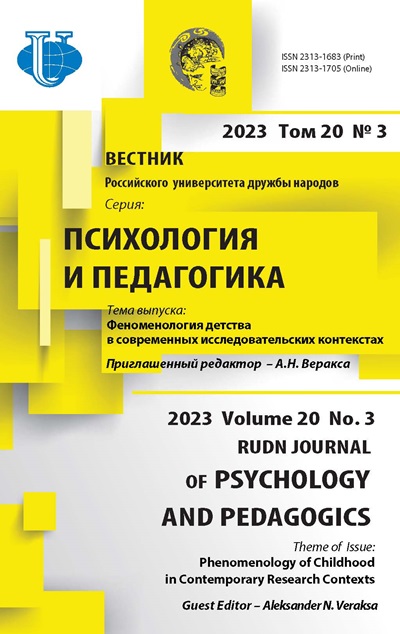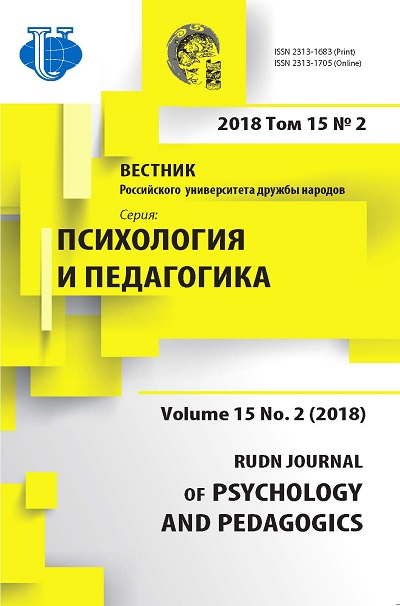IMPACT OF MOVIE ON THE YOUNG VIEWERS’ REPRESENTATIONS OF SENIOR PEOPLE
- Authors: Kubrak T.A1, Grebenschikova T.A1
-
Affiliations:
- Institute of Psychology of Russian Academy of Sciences
- Issue: Vol 15, No 2 (2018)
- Pages: 178-191
- Section: PERSONALITY AND SOCIAL PSYCHOLOGY
- URL: https://journals.rudn.ru/psychology-pedagogics/article/view/18772
- DOI: https://doi.org/10.22363/2313-1683-2018-15-2-178-191
Cite item
Full Text
Abstract
Cinema, as one of the most influential mass media, plays an important role in the life of the modern society, being a very popular leisure activity. Movies have effects on the audience’s motivation, values, stereotypes, activities and mental representations of reality. The current study is devoted to the problem of the movie impact on the young audience. The various effects of the movies about senior people on the young viewers’ corresponding representations are discussed. The psychosemantic method was used to measure the emotional, regulative and cognitive personal traits of both perceived senior and young people. The measurement includes 25 scales designed particularly for eliciting the representations of senior people by the young audience. The viewers scaled seniors’ personal traits before, right after and two weeks later after watching the movie. Also they scaled themselves as being seniors in the future. Such variables as gender, attractiveness of the movie and the place of movies in leisure were taken into account. The film affected the representations of the seniors negatively. The representations of seniors by the young viewers became closer to the representations of themselves as seniors in the future. The gender differences right after the movie became more distinct and women revealed higher sensitivity. The representations became more negative after the movie, but that effect was not a long-term for the majority of the scales. The current issue demonstrated the importance of complex approach toward predicting the influence of the cinema.
About the authors
Tina A Kubrak
Institute of Psychology of Russian Academy of Sciences
Author for correspondence.
Email: kubrak.tina@gmail.com
Ph.D. in Psychology, Research Fellow In Laboratory of Speech Psychology and Psycholinguistics, Institute of Psychology of Russian Academy of Sciences (Moscow, Russia)
13 Yaroslavskaya str., Moscow, Russia, 129366Taisiya A Grebenschikova
Institute of Psychology of Russian Academy of Sciences
Email: gretiya@mail.ru
Ph.D. in Psychology, Senior Research Fellow in Laboratory of Speech Psychology and Psycholinguistics, Institute of Psychology of Russian Academy of Sciences (Moscow, Russia)
13 Yaroslavskaya str., Moscow, Russia, 129366References
- Anderson, C.A., Berkowitz, L., Donnerstein, E.Р., Huesmann, L.R., Johnson, J.D., Linz, D., et al. (2003). The Influence of Media Violence on Youth. Psychological Science in the Public Interest, 4(3), 81—110. doi: 10.1111/j.1529-1006.2003.pspi_1433.x
- Appel M. (2008). Fictional narratives cultivate just-world-beliefs. Journal of Communication, 58(1), 62—83. doi: 10.1111/j.1460-2466.2007.00374.x
- Behm-Morawitz E., & Mastro, D. (2008). Mean girls? The influence of gender portrayals in teen movies on emerging adults’ gender-based attitudes and beliefs. Journalism and Mass Communication Quarterly, 85(1), 131—146. doi: 10.1177/107769900808500109
- Dahl, G., & DellaVigna, S. (2009). Does Movie Violence Increase Violent Crime? Quarterly Journal of Economics, 124(2), 677—734. doi: 10.3386/w13718
- Harris, R. (2002). Psychology of Mass Communication. Saint Petersburg: Praim — Evroznak Publ. (In Russ.).
- Harwood J., & Giles, H. (1992) Don’t make me laugh: Age representations in a humorous context. Discourse and Society, 3(4), 403—436. doi: 10.1177/0957926592003004001
- Holmes, J., & Meyerhoff, M. (2003). (Eds.). The handbook of language and gender. Maiden, Oxford: Blackwell Publishing Ltd.
- Kubrak, T.A. (2016). The problem of information and psychological security in cinema discourse. Psikhologicheskie Issledovaniya, 9(47), 8. http://psystudy.ru (in Russ).
- Kubrak, T.A. (2014). Rol’ psikhologicheskikh kharakteristik vospriyatiya kino v protsesse ego vozdeistviya. In A.L.Zhuravlev & N.D. Pavlova (Eds.). Psikhologicheskoe vozdeistvie v mezhlichnostnoi i massovoi kommunikatsii (pp. 94—111). Moscow: Institut psikhologii RAN Publ. (In Russ.).
- Kubrak, T.A. (2012). Spetsifika psikhologicheskogo vozdeistviya kinodiskursa. In A.L. Zhuravlev & N.D. Pavlova. Psikhologicheskoe vozdeistvie: mekhanizmy, strategii, vozmozhnosti protivodeistviya (pp. 202—222). Moscow: Institut psikhologii RAN Publ. (In Russ.).
- Latynov, V.V. (2013). Psikhologiya kommunikativnogo vozdeistviya. Moscw: Institut psikhologii RAN Publ. (In Russ.).
- Lemish, V.V. (2013). The Social Work Students’ Perceptions of Elderly and Old People. Izvestia: Herzen University of Journal Humanities & Science, (158), 36—48. (In Rus.).
- Levinson, D. (Ed.). (2002). Encyclopedia of Crime and Punishment. Thousand Oaks, CA: SAGE.
- Lowe, T., Brown, K., Dessai, S., de Franca Doria, M., Haynes, K. &Vincent, K. (2006). Does tomorrow ever come? Disaster narrative and public perceptions of climate change. Public Understanding of Science, 15(4), 435—457. doi: 10.1177/0963662506063796
- Martsinkovskaya, T.D. (2014). Social and aesthetic paradigms in methodology of modern psychology. Psikhologicheskie Issledovaniya, 7(37), 12. http://psystudy.ru (In Russ.).
- Mastro D., Behm-Morawitz E., & Kopacz M. (2008). Exposure to television portrayals of latinos: The implications of aversive racism and social identity theory. Human Communication Research, 34(1), 1—27. doi: 10.1111/j.1468-2958.2007.00311.x
- McGreavey, B., & Liendfield, L. (2014). Entertaining our way to engagement? Climate change films and sustainable development values. Int. J. Sustainable Development, 17(2), 123—136.
- Mirrlees T. (2013). Global entertainment media: between cultural imperialism and cultural globalization. New York, London: Routledge, Taylor & Francis.
- Morgan, S.E., Movius, L., & Cody, M.J. (2009). The power of narratives: The effects of entertainment television organ donation storylines on the attitudes, knowledge, and behaviors of donors and nondonors. Journal of Communication, 59(1), 135—151. doi: 10.1111/j.1460-2466.2008.01408.x
- Zhuravlev, A.L., & Pavlova, N.D. (2007). K mezhdistsiplinarnoi problematike diskursa. In A.L. Zhuravlev & N.D. Pavlova (Eds.). Situatsionnaya i lichnostnaya determinatsiya diskursa (pp. 6—11). Moscow: Institut psikhologii RAN Publ. (In Russ.).
- Zhuravlev, A.L., & Pavlova, N.D. (2012). Predislovie. In A.L. Zhuravlev & N.D. Pavlova. Psikhologicheskoe vozdeistvie: mekhanizmy, strategii, vozmozhnosti protivodeistviya (pp. 5—8). Moscow: Institut psikhologii RAN Publ. (In Russ.).
- Zhuravlev, A.L., & Yurevich, A.V. (2012) Nravstvennye problemy sovremennoi Rossii (vmesto predisloviya). In Nravstvennost sovremennogo rossijskogo obshchestva psihologicheskij analiz (pp. 5—21). Moscow: Institut psikhologii RAN Publ. (In Russ.).
















